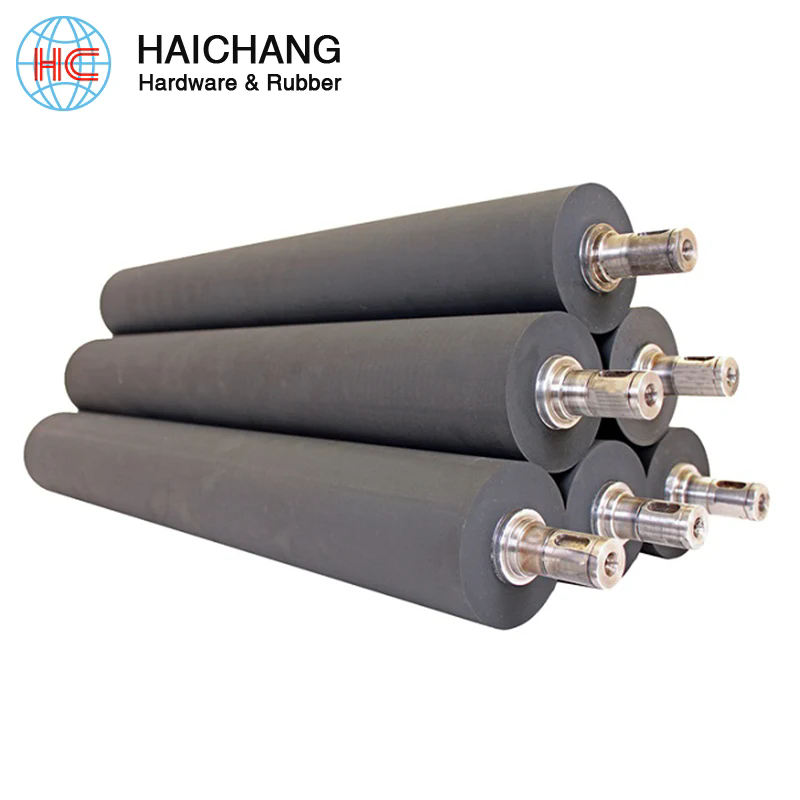What Are Polyurethane Rollers and How Do They Enhance the Performance and Durability of Industrial Systems?
2025-02-20
Polyurethane rollers are a vital component in various industrial processes, from material handling to manufacturing. But what exactly makes them so important? Why are they preferred over other types of rollers, and how do they contribute to the efficiency, durability, and overall performance of industrial systems? Let's explore the benefits of polyurethane rollers and why they are indispensable in today’s industrial world.
What Are Polyurethane Rollers?
Polyurethane rollers are cylindrical components coated or constructed entirely from polyurethane, a highly versatile polymer. These rollers are commonly used in systems where materials such as paper, metal, textiles, or plastics need to be moved or processed. They play an essential role in conveyor systems, printers, textile machinery, and numerous other industrial applications.
Polyurethane is favored for roller coatings because of its unique combination of properties, including high wear resistance, elasticity, and toughness. As a result, polyurethane rollers perform exceptionally well under demanding conditions, offering a longer service life and greater reliability compared to many other roller materials like rubber or steel.
How Do Polyurethane Rollers Enhance Performance?
One of the most significant advantages of polyurethane rollers is their superior performance in a variety of challenging environments. These rollers are specifically designed to meet the needs of industries that rely on consistent and efficient material handling.
1. Reduced Wear and Tear:
Polyurethane is resistant to abrasion, which means that polyurethane rollers last longer compared to rollers made from other materials like rubber. Their resilience to wear and tear ensures that they continue to perform optimally for extended periods, which reduces maintenance costs and downtime.
2. Smooth Operation:
Polyurethane rollers provide smooth and consistent performance, reducing friction during material handling. This translates to better efficiency in moving goods through the system, whether it’s on a conveyor belt, printing press, or in manufacturing equipment.
3. Shock Absorption:
Polyurethane has excellent shock-absorbing properties, which makes these rollers ideal for applications where heavy loads are involved or where products are handled roughly. This ability to absorb shock and vibration reduces the risk of damage to both the rollers and the products being processed.
4. Versatility Across Industries:
Polyurethane rollers can be customized to meet specific application needs. Whether it's the need for a soft, grippy roller for delicate materials or a hard, durable roller for heavy-duty tasks, polyurethane rollers can be tailored to provide optimal performance across a wide range of industries, including printing, packaging, material handling, and textiles.
How Do Polyurethane Rollers Improve Durability?
Durability is a crucial factor in any industrial setting, as equipment failure can lead to costly downtime and repairs. Polyurethane rollers stand out for their exceptional durability, which is a result of the material's physical properties and the manufacturing processes used to produce them.
1. Resistant to Chemicals:
Polyurethane is resistant to a wide variety of chemicals, including oils, solvents, and acids. This makes polyurethane rollers ideal for environments where chemicals are present, such as in manufacturing plants or in handling materials that may come into contact with harsh substances.
2. Resilience to Extreme Temperatures:
Polyurethane rollers maintain their structural integrity and performance even in extreme temperatures, whether they are exposed to freezing cold or intense heat. This makes them suitable for use in environments with fluctuating temperature conditions, such as food processing, textiles, and other industrial sectors.
3. Longer Lifespan:
The resilience of polyurethane allows these rollers to have a much longer lifespan than rollers made from rubber or plastic. As a result, businesses save money on replacement costs and experience less downtime for maintenance and repairs.
How Are Polyurethane Rollers Manufactured?
The manufacturing process of polyurethane rollers involves several steps to ensure the final product meets the desired specifications. The process typically starts with a steel core or shaft, which serves as the base of the roller. Polyurethane is then molded or cast around the core, creating a solid and durable coating.
One of the key steps in the manufacturing process is selecting the right grade of polyurethane. There are different grades of polyurethane, ranging from soft and flexible to hard and rigid, and the selection of the appropriate grade depends on the specific application of the roller.
Once the polyurethane is applied, the roller is typically subjected to a curing process, which hardens the material and ensures the roller's resistance to wear and environmental factors. After curing, the roller is tested to ensure that it meets the necessary standards for hardness, elasticity, and durability.
What Are the Applications of Polyurethane Rollers?
Polyurethane rollers are found in a wide range of industries, serving a variety of functions. Some of the most common applications include:
- Conveyor Systems: Polyurethane rollers are extensively used in conveyor systems to move materials smoothly and efficiently across production lines or warehouses. Their ability to withstand heavy loads, resist abrasion, and operate at high speeds makes them ideal for this purpose.
- Printing Industry: In printing presses, polyurethane rollers are used to transport paper and ink. Their smooth, consistent surface ensures that printed material is handled delicately and without damage.
- Textile Industry: Polyurethane rollers are used in textile machinery to move fabrics through various stages of production. Their ability to handle delicate materials without causing damage or creases is crucial in this sector.
- Food Processing: Polyurethane rollers are also used in the food industry to handle food products safely and efficiently. Their resistance to chemicals and temperature extremes makes them perfect for environments where hygiene and durability are paramount.
- Packaging: In packaging lines, polyurethane rollers are used to help move products to be packaged. The durability of the rollers helps maintain a high level of productivity and reduces the need for frequent replacements.
How Do Polyurethane Rollers Contribute to Cost Savings?
While the initial cost of polyurethane rollers might be higher compared to other roller materials, the long-term benefits make them a cost-effective choice. Their extended lifespan, reduced maintenance needs, and ability to handle high-pressure and heavy-duty tasks mean that businesses save money over time.
Additionally, because polyurethane rollers improve operational efficiency and reduce downtime, businesses can see a return on investment through increased productivity and fewer disruptions in their workflow.
Conclusion
Polyurethane rollers are a cornerstone in modern industrial systems, offering exceptional durability, performance, and versatility. From their ability to resist wear and tear to their smooth operation and shock-absorbing qualities, these rollers provide a reliable solution for industries ranging from manufacturing to printing and packaging. By choosing polyurethane rollers, businesses can significantly enhance the efficiency of their operations, reduce maintenance costs, and increase their bottom line. So, whether you’re running a conveyor system or a printing press, polyurethane rollers are a smart investment that will stand the test of time.



